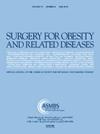代谢/减肥手术候选者功能失调性子宫出血发病率高:子宫内膜癌风险增加?
IF 3.8
3区 医学
Q1 SURGERY
引用次数: 0
摘要
背景子宫内膜癌(EC)是肥胖相关性最强的恶性肿瘤,也是年轻女性中增长最快的癌症。早期发现重度肥胖妇女的子宫内膜癌和其他子宫内膜病变(恶性和非恶性)可改善治疗方案和子宫的保存。使用异常或绝经后子宫出血(APUB)作为代谢/减肥手术女性子宫内膜病变的替代物进行筛查可能对临床有益,但支持这一努力的数据有限。目的制定并实施一项筛查计划,将 APUB 作为减肥手术候选者子宫内膜病变的替代物。方法 "改良 SAMANTA "是一份包含 10 个项目的问卷,用于识别 APUB 患者,特别是结合了用于识别无排卵/绝经后出血和大量月经出血的工具。利用 2021 年 3 月至 2023 年 5 月的数据,对人口统计学(年龄、种族)、体重指数和问卷调查数据进行了阳性筛查分析。结果在 1371 名符合手术评估条件的女性中,确定了 664 名(48.4%)阳性筛查患者,并转诊进行妇科评估,以排除子宫内膜增生/癌或其他子宫内膜病变。APUB筛查阳性的可能性与体重指数增加(P = .001)、黑人/非洲裔美国人种族增加(P = .003)以及SAMANTA评分增加(P <.001)有关。结论接受代谢/减肥手术的女性APUB发病率很高,由于这种功能失调性出血和同时存在的肥胖,患潜在EC的风险更大。APUB的潜在风险因素包括体重指数增加、年龄较小、黑人/非洲裔美国人。标准化筛查和适当的妇科转诊应成为严重肥胖妇女整体评估的常规部分。本文章由计算机程序翻译,如有差异,请以英文原文为准。
High prevalence of dysfunctional uterine bleeding in candidates for metabolic/bariatric surgery: increased endometrial cancer risk?
Background
Endometrial cancer (EC) is the strongest obesity-associated malignancy and the fastest-growing cancer in young women. Early identification of EC and other endometrial pathology (malignant and nonmalignant) in women with severe obesity may improve treatment options and uterine preservation. Screening for endometrial pathology using abnormal or postmenopausal uterine bleeding (APUB) as a surrogate in women pursuing metabolic/bariatric surgery may be clinically beneficial, but data supporting this effort are limited.
Objective
To develop and institute a screening program for APUB as a surrogate for endometrial pathology in bariatric surgery candidates.
Setting
Two, academic metabolic/bariatric surgery programs in Louisiana, United States.
Methods
The Modified SAMANTA is a 10-item questionnaire that was implemented to identify patients with APUB, specifically combining tools designed to identify anovulatory/postmenopausal and heavy menstrual bleeding. Demographic (age, race), body mass index, and questionnaire data were analyzed with respect to positive screening using data from March 2021 through May 2023.
Results
Of 1371 eligible women presenting for surgical evaluation, 664 (48.4%) positive screens were identified and referred for gynecologic evaluation to rule out endometrial hyperplasia/cancer or other endometrial pathology. The likelihood of positive screening for APUB was associated with increasing BMI (P = .001) and Black/African American race (P = .003), as well as increasing SAMANTA score (P < .001). In contrast, risk of positive screening was negatively associated with increasing age (P < .001).
Conclusions
Women presenting for metabolic/bariatric surgery have a high prevalence of APUB and, given this dysfunctional bleeding and concurrent obesity, are at greater risk for underlying EC. Potential risk factors for APUB, given their associations with screening positive, include increased body mass index, younger age, and Black/African American race. Standardized screening with appropriate gynecologic referral should be a routine part of the overall evaluation for women with severe obesity.
求助全文
通过发布文献求助,成功后即可免费获取论文全文。
去求助
来源期刊
CiteScore
6.70
自引率
12.90%
发文量
570
审稿时长
56 days
期刊介绍:
Surgery for Obesity and Related Diseases (SOARD), The Official Journal of the American Society for Metabolic and Bariatric Surgery (ASMBS) and the Brazilian Society for Bariatric Surgery, is an international journal devoted to the publication of peer-reviewed manuscripts of the highest quality with objective data regarding techniques for the treatment of severe obesity. Articles document the effects of surgically induced weight loss on obesity physiological, psychiatric and social co-morbidities.

 求助内容:
求助内容: 应助结果提醒方式:
应助结果提醒方式:


